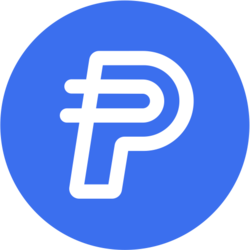PayPal USD Price
PYUSD
How Much is 1 PayPal USD (PYUSD)
Convert PYUSD to your currency
Last Updated on Feb 15, 2026 05:04 PM
What is PayPal USD?
About the coin
PayPal USD is a stablecoin designed to leverage the opportunities that stablecoins offer for payments. It is fully backed by U.S. dollar deposits, short-term U.S. Treasuries, and similar cash equivalents. This ensures that the value of PayPal USD remains stable and is pegged to the U.S. dollar.
Main features
One of the main features of PayPal USD is its redeemability. It can be redeemed 1:1 for U.S. dollars, providing users with a reliable and stable digital currency option. The issuance of PayPal USD is managed by Paxos Trust Company, which is known for its expertise in digital asset management and regulatory compliance.
How it works
PayPal USD operates on the Ethereum network, leveraging blockchain technology to facilitate secure and efficient transactions. Users can manage their PayPal USD through PayPal's digital wallet, allowing for seamless integration with PayPal's existing payment infrastructure. This integration aims to enhance the utility of stablecoins in everyday transactions, making digital payments more accessible and convenient.
Wallet for PayPal USD
Experience the future of Crypto Wallets with Tangem
Tangem supports networks for PayPal USD
- Ethereum
- Solana
- Arbitrum One
Metrics
Insights
Price performance
Another
Links
Official links
Social
PayPal USD FAQ
- PayPal USD is a blockchain-based digital asset used for transferring value and interacting with decentralized applications. It operates without central control, relying on distributed network technology.
- PayPal USD offers efficient transactions, strong network security, and support for decentralized applications. Its design aims to provide a reliable user experience.
- Yes. PYUSD is the trading symbol used to identify PayPal USD on exchanges and charts.
- You can buy PayPal USD using on-ramp services available in Tangem Wallet or exchanges. After purchasing on an exchange, you can transfer it to your Tangem Wallet.
- The safest option is to use a hardware wallet that keeps your private keys offline. Tangem provides secure cold storage protection.
How to secure PayPal USD with Tangem Wallet?
Tangem products are for everyone, from beginners to experts. They keep your crypto safe and easy to manage. With cutting-edge technology, Tangem lets you control and protect your digital assets.
Get TangemGet the Tangem Wallet and take control of your assets with just one tap. It's perfect for anyone new to crypto and offers a great experience for more experienced users too.
Sync Tangem Wallet with our App. During the activation process, the card’s embedded chip generates a random private key, ensuring that the wallet cannot be compromised.
Discover the power of crypto. Manage crypto with balance tracking, secure transactions, and direct purchases or swaps through Tangem Wallet.
Why choose PayPal USD wallet with Tangem.
Private. No registration and KYC required to use the app. We don't track your data.
Secure. Your private keys are encrypted and never leave your device. Only you have control over your funds.
Innovative Design Options. Choose from a variety of elegant designs, including unique co-branded editions and our innovative ring-form factor wallet, ensuring both style and functionality.
24/7 Online Support. Fast support for your needs. Live chat and email support for customers from all over the globe.
Other crypto assets supported in Tangem Wallet.
Stay connected.
Don’t miss out on our progress and latest updates. Have an impact — join our community today!

🎉 You've unlocked 15% OFF!
Use 15OFFRING — valid for Tangem Ring till 30/09/2025 | Tap & Get